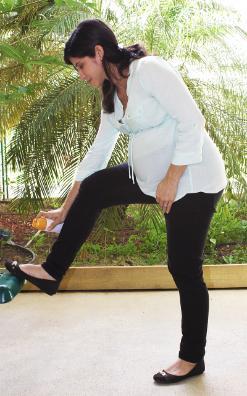How To Apply Mosquito Repellent
Repellents make humans unattractive to a mosquito so that it will avoid areas of the body that have been treated with the product. Repellents  do not kill mosquitoes. The best repellents will provide protection from bites for a long period of time (> one hour) with a single application. University of Florida mosquito researchers test and evaluate the effectiveness of mosquito repellents based on the amount of time the product will continue to repel mosquitoes after one application to the skin. This is known as Complete Protection Time (CPT). Repellents that are currently available are either synthetic chemicals, such as DEET, picaridin, and IR3535, or plant-derived chemicals such as citronella and oil of lemon eucalyptus. Various formulations of these repellents are available that differ in the amount of active ingredient, which is the substance that actually repels the mosquito. These products are available as sprays, wipe-ons, sticks, foams, lotions, and area repellents.
do not kill mosquitoes. The best repellents will provide protection from bites for a long period of time (> one hour) with a single application. University of Florida mosquito researchers test and evaluate the effectiveness of mosquito repellents based on the amount of time the product will continue to repel mosquitoes after one application to the skin. This is known as Complete Protection Time (CPT). Repellents that are currently available are either synthetic chemicals, such as DEET, picaridin, and IR3535, or plant-derived chemicals such as citronella and oil of lemon eucalyptus. Various formulations of these repellents are available that differ in the amount of active ingredient, which is the substance that actually repels the mosquito. These products are available as sprays, wipe-ons, sticks, foams, lotions, and area repellents.
- READ AND UNDERSTAND THE LABEL!!! Apply according to the directions on the label. Do not use any repellent that has not been approved by the EPA. To find this information, you can visit the EPA's website www.epa.gov or look for an EPA registration number on the label.
- As with all over-the-counter products, use common sense when applying. Watch for reactions, some people may be allergic to ingredients in the repellent.
- Do not apply to the mouth or eyes, cuts, wounds, or on sunburned or irritated skin.
- To apply to face, spray on hands first and then rub on face.
- Apply ONLY to the parts of the body that are exposed. Some repellents can be applied directly to clothing, but check the label first. Do not apply to skin that will be covered by clothing.
- Do not allow young children to apply repellents.
- Apply only as often as the label says. More is NOT better! If the repellent wears off earlier than expected, read the label to determine how often it is safe to re-apply.
- Keep in mind that some things may decrease the effectiveness of a repellent such as: activities that cause perspiration, high humidity, high temperature, rainfall, and swimming.
